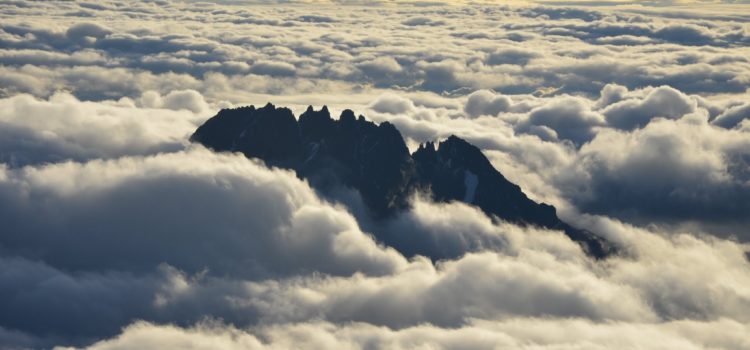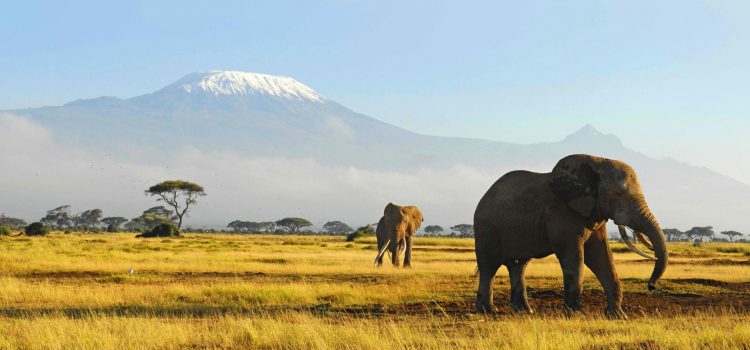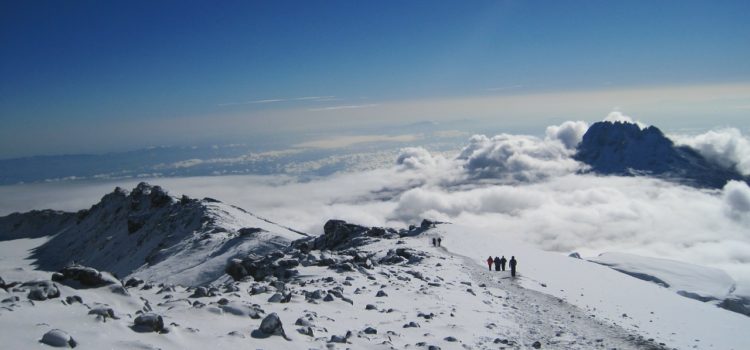Top Tips on Climbing Mount Kilimanjaro
Choose Your Route
There are seven main routes up Kilimanjaro. Each one varies in terms of difficulty, traffic, and scenic beauty, and choosing the right one for you is a key part of the planning process. Timings depend on which route you choose, with hikes taking anywhere from five to 10 days. The routes with the highest success rate are those that take longer and ascend at a gradual rate, allowing climbers to acclimatize to the change in altitude. Marangu is traditionally considered the easiest route but Rongai, Lemosho, and Northern Circuit have the highest success rates.
Top Tip: Allow time for a longer trek in order to maximize your chances of reaching the summit.
Pack Carefully
It’s important to find the balance between packing light and making sure that you have everything you need. Layers are crucial given the diversity of Kilimanjaro’s climate. You’ll need sun protection for the lower reaches, and warm clothes for the summit. A good quality sleeping bag is essential, as is a basic first aid kit (your operator should provide more extensive safety items, including oxygen and a defibrillator). It is possible to rent equipment on-site, although quality and fit vary greatly.
Remember to pack spare batteries for your camera, and photocopies of your passport/ insurance documents.
Top Tip: Make sure to carry cash for tipping your guide and your porter, who will carry up to 30 lbs/15 kg of your personal gear for you.
Get Acclimatized
Altitude sickness is the single biggest reason for failed summit attempts on Kilimanjaro. The best way to acclimatize to the mountain’s extreme altitude is to choose a route that ascends gradually, taking six days or longer. Certain medications (like Diamox and Ibuprofen) may help to lessen the effects of altitude sickness, while hydration (preferably with purified water) is also important. Altitude sickness can affect anyone, regardless of your training or fitness, and as such it’s vital that you are able to recognize the symptoms.
Read up on the effects in advance, and be prepared to descend if necessary.
Top Tip: Learn your limits and don’t attempt to push them. When it comes to Kilimanjaro, slow and steady really does win the race.
Budgeting for Your Trip
A Kilimanjaro trek can cost anywhere from $2,400-$5,000 or more per person. This fee should include camping, food, guides, park fees and transport to and from the mountain. You need to make sure that your food is decent, that your guides and porters are fairly treated and well trained and that you get a good night’s sleep. While the shorter routes are cheaper, your chances of reaching the summit are significantly reduced as a result of poor acclimatization. If you opt for a “good deal” make absolutely sure that your guides and porters are well-equipped to handle emergencies.
Find a Tour Operator
Experts estimate that only 65% of climbers reach the summit of Kilimanjaro, but your chances increase significantly if you choose the right operator. It is compulsory to climb Kilimanjaro with a guide, and although it is possible to find independent guides for slightly cheaper rates, organized tours offer a better experience and better back-up in case of emergency. Operators vary from first-class to downright negligent, so it’s important to be selective and to prioritize safety over cost. Thomson Treks is a respected operator with a 98%+ success rate.
Why you shouldn’t go on safari or climbing Mt Kilimanjaro alone
To go on safari you have to go as a couple and you have to be head over heels in love. Plus you have to wear matching khaki-beige safari hats and multi-purpose trousers with at least ten pockets. If you don’t tick the above, sorry, but you can’t come. – Of course, we’re kidding.
Going solo on safari is becoming more and more popular, almost 10% of our guests are solo travellers. And we love it!
For many going on a safari or climbing Mt Kilimanjaro is a once in a lifetime dream come true, an experience that may change the way you see the world. Not everyone nursing this dream has a partner, friend or family who share it. We believe, you shouldn’t miss out, just because your boyfriend does.
Join a small group tour
Many solo travellers join an overland tour; a group of about twenty people travelling in a bus-like truck often across multiple African countries. And while this is a great budget friendly option, the sometimes-rowdy summer-camp atmosphere is not for everyone. Join a small group tour instead and share your 4×4 Land Cruiser with a maximum of six other travellers and your group’s private guide. The advantages are many:
- Costs for vehicle and guide are shared, making it less expensive than a private safari.
- Once two guests have booked a safari for the scheduled date, the safari will definitely depart. That means it only takes one other person and your group safari is confirmed.
- If you go on a group camping safari, you can share your tent with someone of the same sex and save on that single-supplement.
- You can share your thoughts and excitement about all the new experiences with your newly made friends.
- No lonely dinners with book and phone, as you will eat together as a group.
Worried you’ll be the only one solo amongst six cooing lovebirds? Couples joining a group tour are aware that they are not in for the most intimate honeymoon but enjoy sharing their experience with others and meeting new people.
Climbing Kilimanjaro solo
Climbing Kilimanjaro is a very special experience and one of these once-in-a-lifetime dreams you may not share with your partner. But just because your fiancé doesn’t see the fun in not showering for six days, doesn’t mean you have to miss out.
In fact, almost half of all our guests travelling alone joined a Mt Meru or Kilimanjaro group climb. On the mountain, you build a very special bond with your fellow climbers and crew. You motivate each other, look out for each other and get to know each other during those long hours putting one foot in front of the other. After only a few hours, you won’t be a solo traveller, but simply part of a team who all share the same goal – getting to the mountain top and safely back down again.
Go on your own private safari with your private guide
Not everyone travelling alone is looking for company. You may be purposefully looking for a solo safari, just because you enjoy travelling alone and want to be as flexible as possible.
On your private safari, it’ll be just you and your safari guide. We believe, a safari is only as good as the guide who accompanies you. And this will become all the more apparent when you travel solo with your own private guide.
You’ll be spending many hours together on the road and in the national parks. A great opportunity to not only learn about flora and fauna of Tanzania, but to hear about everyday life first-hand from your local guide.
Travelling alone should never keep you from travelling Tanzania. Be open, be curious, be street-savvy and take a break from the world as you know it.
How To Choose The Best Kilimanjaro Operator
How To Choose The Best Kilimanjaro Operator
What signs do you need to look for when choosing a tour operator to take you on a trek up Mount Kilimanjaro? It’s a hugely important decision, so do your research well and early, says our expert, Safari Wanderer.
Safety First
There’s no reason why a trek up Mount Kilimanjaro should be dangerous, but choosing a bad operator could make it exactly that. This decision is probably the most important one when you’re doing your planning. After all, your operator will be responsible for your safety on the mountain, your comfort and your chances of reaching the summit. So, you need to make sure that they measure up on a number of fronts.
Book Local
Some people are more comfortable booking with an operator in their own country – but why? Many of the foreign-based operators actually use local trekking agencies to provide the guides on the mountain, so booking with a Tanzanian operator for your Kilimanjaro trek means that everything is controlled and managed by them locally. And in this day of internet, e-mail and Skype, you can ask a Tanzania-based operator all the questions you want, whenever you want. Search out a good, Tanzanian operator to take you to the summit!
Plan ahead, book ahead
Book your Kilimanjaro trek well in advance and you will benefit from the advice of your Kilimanjaro operator. A good operator will be able to advise you on important matters such as getting fit, sourcing the right equipment, what to bring in your daypack. And by planning ahead, you will have time to do some practice walks, trying out your boots and specialist clothing.
Read the reviews
However good your operator claims they are, you can get extra comfort from using the feedback given by those who’ve climbed with them before you. Don’t just spend a few seconds on this: read the reviews in detail. Have any concerns been expressed by visitors about safety, the food or the quality of the tents on their Kilimanjaro trek? What are people saying about the quality of their mountain guides? How do they treat the porters? Remember that climbing Kilimanjaro is a serious exercise and a poor quality operator who doesn’t pay attention to these matters may not get you to the top in comfort – or at all! If you don’t like what you read, if you have concerns, then it’s simply time to move on and find another operator.
Read The Operators Website
A good operator has to care about your safety on the Kilimanjaro trek, and they will want you to be prepared before you arrive. Check their website pages carefully – they should have something called ‘Trip Notes’ or something similar, giving you detailed information on how to be ready for your climb-of-a-lifetime. Are their mountain guides experienced and trained? Ask yourself: if the operator hasn’t prepared this information for its future visitors, is it likely to be your best choice to take care of you on the climb itself? On the other hand, if the information is helpful and comprehensive, then it is probably good evidence that they are professional. Enjoy your Kilimanjaro trek!



